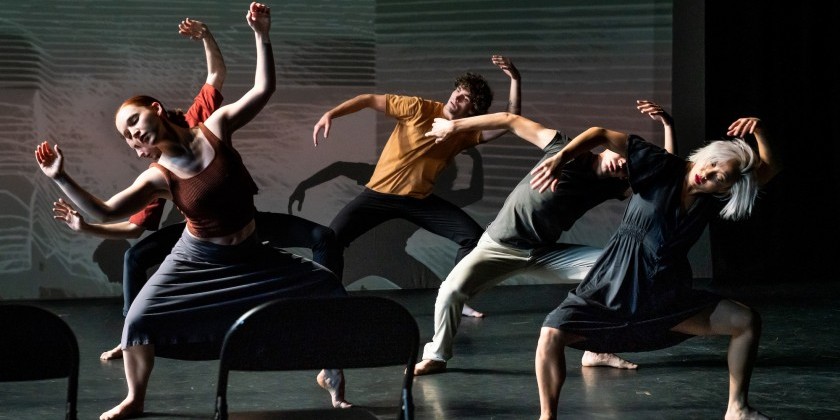Artists Activated: Dancing Women Entrepreneurs - Meet Nicole Buggé, Ashani Mfuko, and Eliza Tollett

#GetEnthused by Women who Finance Their Dance, Find Opportunity, and Create Brands
Pictured above from L to R: Eliza S. Tollett, Photo: Al Viciedo; Nicole Buggé of Buggé Ballet; Photo: Viciedo Photography; Ashani Mfuko, Photo credit: Mission 101 Media
Balanchine famously opined “Ballet is Woman.” Another field quickly becoming “Woman” is that of small business. As of 2015, women owned 9.4 million of them, employing 7.9 million people and producing $1.5 trillion in revenue. In New York, three dancers have discovered that pirouettes and P&L (profit and loss) statements make for a lucrative combination.
Unlike many artists who consider penury part and parcel of their chosen path, social media and video marketing maven Ashani Mfuko states, “I was never down with the no money.” To her, the dance community “needs to work smarter not harder,” a counterargument to the prevailing notion that dancers’ success is measured by hours logged in the studio and on the stage. A proponent of creating passive income, her business extends beyond helping companies like Bloch Dancewear USA more than double its number of Instagram followers. Mfuko wrote an ebook entitled Finance Your Dance for a class that Alicia Graf Mack (former lauded performer with Alvin Ailey American Dance Theater) taught at Webster University; she’s made it available for purchase, so everyone can enhance his, her, or their business sense.

Nicole Buggé of New Jersey-based Buggé Ballet was dismayed by the lack of financially viable opportunities available to her and her friends. “I didn’t want to be the person who was always asking for money. I want to make my own opportunities,” she says. A chance visit to Liberty Hall Museum on the grounds of Kean University planted the seed for a site-specific dance festival that, she suspected, would appeal to the untapped market in northern New Jersey. Former home of New Jersey’s first elected governor and signer of the Constitution, William Livingston, Liberty Hall Museum responded to her proposal with gusto and plenty of resources (payment processing, sound equipment) to ensure that the debut festival was a success — artistically and financially. The second Liberty Hall Dance Festival is planned for September 2018, and Buggé is evaluating other opportunities to combine dance with popular New Jersey interests such as food and wine.
Eliza S. Tollett was caught in the typical whirlwind of many freelance artists — cobbling together a living from teaching and performing gigs. Exasperated by the judgment intrinsic in traditional ballet education and seeking more financial stability, she created The Ballet Spot, a one-hour class offering training and technique to newcomers and professionals alike. “For dancing and learning’s sake,” she clarifies. Tollett structures each class around an element like pas de chat or pirouette en dehors from fifth so “everyone will accomplish or improve upon something.” She teaches and takes class simultaneously to maintain a steady pace that keeps boredom and frustration at bay. In business since 2017, she’s added classes to keep up with demand and is in talks with gyms to bring her special brand of ballet to their fitness schedules.

These entrepreneurs began with a wealth of skills accrued from years spent as dancers. They intuitively understood self-motivation, discipline, and the manipulation of personal passion. All, though, needed to boost their knowledge. “I had to learn to make a marketing plan and write grants,” Buggé says. Tollett didn’t use a lawyer when forming her LLC because, as she says, “I’m going to figure out this thing on my own.” Mfuko sums it up aptly, “If you’re willing to learn, you can do anything.” When they experienced bumps in their learning curve, they overcame them due to their can-do attitude.
All identify adaptability as the key to their success. Mfuko originally started her small business journey with a staffing agency for dance teachers. It grew and grew, but she found it too stressful to maintain. So she took the marketing talents she honed to transition into consulting, at which she’s been flourishing for eight years. Now, she’s focused on reaching dancers internationally with an online branding boot camp. Tollett is navigating the tricky landscape of advertising. She stays open to a variety of opportunities from teaching a free class at Athleta to connecting with neighbors through Nextdoor.com. Buggé is knee-deep in business books as she evaluates how to take Liberty Hall Dance Festival to the next level. “I want to bring in a residency and connect with the Kean dance program.”

These businesswomen activate space powerfully and personally. Tollett actuates it “by being persistent in my vision for The Ballet Spot as a safe space for people of all shapes, ages, genders, backgrounds, and socioeconomic statuses to come together and dance ballet without judgment.” Buggé states, “I work with partners in locations where dance is not usually found to bring those spaces alive by folding movement into their environment.” Mfuko asserts her relationship to space succinctly. “I activate space by commanding it, and owning it.”
They are brimming with suggestions for future entrepreneurs. “Seek out business-minded friends,” Buggé advises. “Be a lean entrepreneur,” says Tollett. Mfuko counsels that individuals should first, “ask yourself what problem do you want to solve?” She suggests identifying how one’s unique skills can offer value and fit into the big scheme of things. All underscore the importance of going for it. “You’ll stumble, but you can figure it out,” says Buggé.
The Dance Enthusiast Covers What Dancers Are Talking About and Creates Conversation.
For more Behind the Scenes Stories of the NYC Dance World Click on to our Day In The Life of Dance Section














